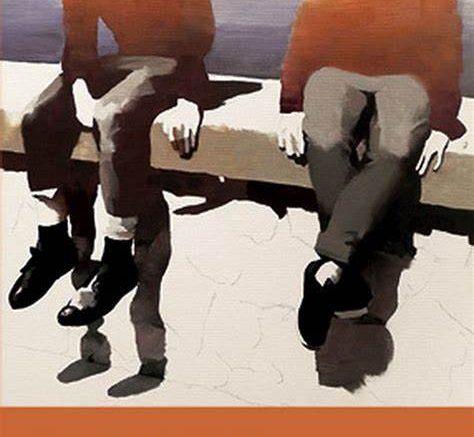di Emiliano Tognetti
Noi di 7Gifts.org, abbiamo incontrato Charlotte Gneuss autrice di “Gittersee”, tradotto in italiano con il titolo di “I confidenti” (ed. it. Iperborea), e ci ha parlato della sua ultima fatica. Dopo un pò di difficoltà tecniche, riusciamo a proporvi l’intervista in italiano, troverete anche l’originale in inglese.
Ringraziamo la casa editrice “Iperborea” per questa possibilità.
Emiliano: Charlotte. Il tuo libro ha gli elementi per essere considerato un racconto di grandi passaggi. Non ti sembra che Marie abbia perso un po’ della sua innocenza?
Charlotte: Perdiamo sempre l’innocenza, in un certo senso, nelle nostre vite, perché viviamo e abbiamo relazioni. Dobbiamo certamente agire, voglio dire, Marie è innamorata, poi il suo ragazzo se ne va. Lui se ne va e lei è triste e arrabbiata, e in seguito lavora con la polizia segreta. Non posso fare spoiler, ma immagino che lei perda un po’ di bene.
Emiliano: Una cosa che mi ha colpito, almeno nell’edizione italiana, è che la mancanza di virgolette nel dialogo diretto è un fattore voluto? Se sì, perché?
Charlotte: Ho tralasciato le virgolette perché poi, da lettore, devi valutare se sia qualcosa che la persona dice o che la persona pensa, e se faccia una grande differenza. Presumo che il lettore sia molto intelligente e debba scoprirlo da sé.
Emiliano: Il libro è ambientato nella Germania degli anni ’70. In alcune pagine trasmetti alcune pennellate di quella guerra (fredda, ndt), soprattutto a scuola. Che immagine di quella guerra hai voluto dare nel tuo libro? Secondo te che influenza ha sui personaggi?
Charlotte: Potresti ripetere l’ultima frase?
Emiliano: Secondo te che influenza ha (la guerra fredda) sui personaggi? Sono negli anni ’70. Nel tuo libro dici, che sono negli anni ’70, e in particolare a scuola. Che influenza ha esercitato il comunismo sui candidati?
Charlotte: È difficile dirlo perché il sistema comunista ha un’influenza su chi lo vive. Voglio dire, ogni sistema influenza ciascuno. Anche se viviamo in un mondo capitalistico, siamo influenzati dal sistema, dalle cose che indossiamo, dalle cose che vogliamo essere. In un mondo socialista come quello in cui vive il mio protagonista, è più come se fosse molto importante la dimensione collettiva. Essere una brava persona, essere bravo per il tuo libro (sic), è qualcosa che è molto radicato in un piano socialista. Devi ricordarti un po’ di essere buono per il gruppo. Questo è un conflitto (interiore, ndt) che tutti affrontano, almeno in un sistema socialista. Forse è così.
Emiliano: Pensi che il libro possa avere un seguito o è finito?
Charlotte: Le storie non sono mai finite, ma il libro è concluso.
Emiliano: Grazie.
English
Emiliano: Charlotte. Your book has the elements to be considered a tale about great passages. Doesn’t Marie, seem to lose some of her innocence?
Charlotte: We always lose innocence, in a way, in our lives because we live and we have lost relations. We have to act. Sure. I mean, she’s in love. Then her boyfriend leaves. He leaves, and she is sad, and she’s angry, and then she’s here, and she’s working with this security police. I cannot spoil that, but I guess she’s losing some good.
Emiliano: One thing that has struck me, at least in the Italian edition, is the lack of quotation marks in the direct dialogue is a desired factor? If yes, why?
Charlotte: I took these quotation marks because then as a reader, you have to think is that something the person says, or is it something the person thinks and it makes a big difference? I wanted the reader, I guess the reader is very clever and he had to find out about himself.
Emiliano: The book is set in Germany in the ’70s. In some pages, you convey some brushstrokes of that war, especially in school. What image of that war did you want to give in your book? In your opinion, what influence does it have on the characters?
Charlotte: Could you repeat the last sentence?
Emiliano: In your opinion, what influence does it have on the characters? They are in ’70s. You speak the word that they are in the ’70s in your book, especially in school. What influence have they put communism on the candidates?
Charlotte: It’s difficult to tell because the communist system has influence. I mean, every system influences every one of us. I mean, even if we are living in a capitalistic world, we are influenced by the system, by the things we are wearing, by the things we want to be. In a socialistic world like my protagonist is living in. It’s more like the collectives are very important. If you are a good person, if you are good for your book, this is something which is very deep in the socialistic plan. You have to remind yourself a bit to be good for the group. This is in conflict. Everybody has at least in this socialist. Maybe like that.
Emiliano: Do you think the book could have a sequel or is it finished?
Charlotte: Stories are never finished. Yes, but the book ends.
Emiliano: Thank you.

Be the first to comment on "Salto 2024: Intervista a Charlotte Gneuss autrice de “I confidenti” (ed. it. Iperborea)"